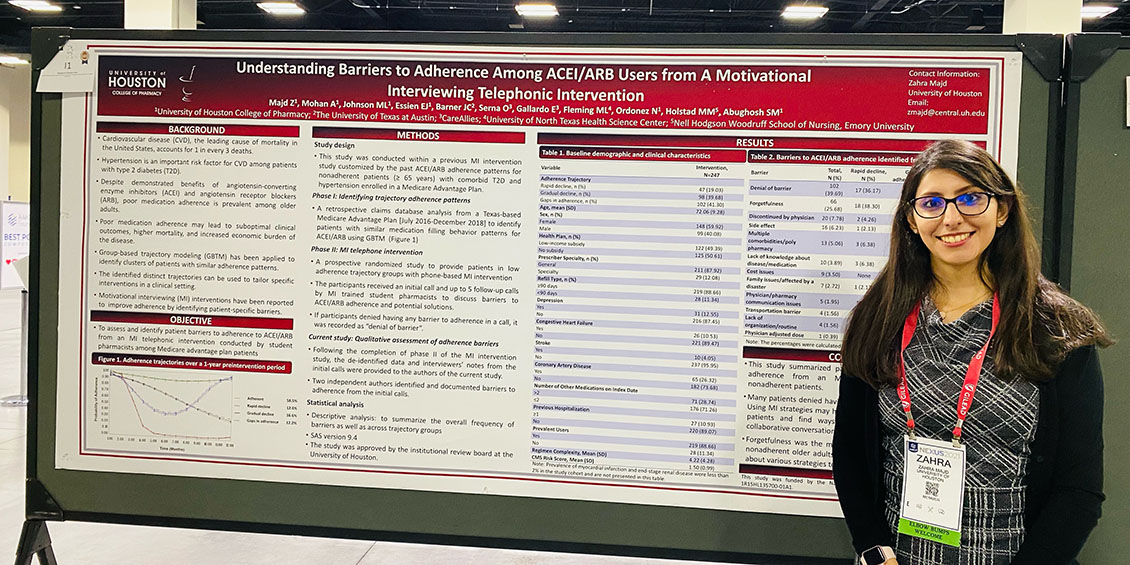Research News

Back-to-Back Bronze
Ph.D. Student Earns 2nd Medal at AMCP Nexus Meeting for Research on Patient Barriers to Anti-Hypertensive Medication Adherence
October 27 — Forgetfulness was the most common patient-reported barrier to anti-hypertensive medication adherence according to a Bronze Medal-winning study presented by a UH College of Pharmacy Ph.D. student at the Academy of Managed Care Pharmacy’s AMCP Nexus Meeting Oct. 18-21 in Denver, Colo.
The study by Zahra Majd, Pharm.D., a student in the Pharmaceutical Sciences Ph.D. – Pharmaceutical Health Outcomes and Policy Concentration program, was supported by a National Heart Lung and Blood Institute grant to her adviser, UHCOP Associate Professor Susan M. Abughosh, Ph.D.
The overall project examined records of telephone-based interventions using motivational interviewing (MI) techniques by pharmacy students to improve patient adherence to angiotensin-converting enzyme inhibitors (ACEI) and angiotensin receptor blockers (ARB) anti-hypertensive medications among Medicare Advantage Plan non-adherent patients with hypertension and type 2 diabetes. Hypertension is a major risk factor for cardiovascular diseases in patients with type 2 diabetes, but the prevalence of poor medication adherence leads to uncontrolled blood pressure and higher death rate in this patient population.
The study of 247 patients found that over half of the population reported at least one barrier, while 41% did not report any barriers despite their poor adherence. Other reported barriers included discontinuation by physicians (12.9%), side effects (10.3%), multiple comorbidities/polypharmacy (8.4%), lack of knowledge about disease/medication (6.5%), cost issues (5.8%), and family issues (4.5%). When the researchers segregated the groups by adherence trajectory – either rapid decline, gradual decline and gaps in medication adherence – denial of barrier and forgetfulness were the most common responses.
The researchers indicated that identifying adherence barriers will help to design future interventions addressing these barriers and help to improve patients' adherence to ACEI/ARB therapies.
Other coauthors of the study were UHCOP Ph.D. candidate Anjana Mohan and faculty members Michael Johnson, Ph.D., E. James Essien, M.D., DrPH, and Nancy Ordonez, Pharm.D., BCPS; University of Texas at Austin faculty member Jamie C. Barner, Ph.D., FAACP, FAPhA; CareAllies’ Clinical Operations Director Omar Serna, Pharm.D., BCACP, and Chief of Pharmacy Estaban Gallardo, Pharm.D.; University of North Texas faculty member Marc Fleming, Ph.D., R.Ph.; and Emory University Nell Hodgson Woodruff School of Nursing faculty member Marcia Holstad, DSN, RN, FNP-BC. The team’s abstract was published in a special meeting supplement in the October issue of the Journal of Managed Care Pharmacy (JMCP).
This year’s recognition is the second consecutive AMCP Nexus Bronze Medal for Majd, whose 2020 project — "Predicting Future Adherence to Statins Using Previous Adherence to Antihypertensive Drugs" — which found that about 40% of patients were adherent to their statin use during the first year of treatment initiation which was significantly associated with their past adherence to ACEIs/ARBs.